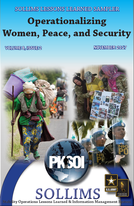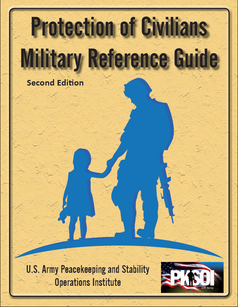SHARED ACCORD 18 MPE ResourcesRwanda, the United States, and other participating nations conduct Exercise Shared Accord 18, a Command Post Exercise (CPX) vicinity Kigali, Rwanda from 15 to 30 August 2018 in order to improve the interoperability and capabilities of the participating military, police, intergovernmental, and non-governmental organizations to respond to UN/AU mandated peace operations.
|
Public Media Articles
- From peacekeeper to peacemaker? Understanding the role of the United Nations in CAR
- From peacekeeper to peacemaker? The UN mission at work in one of Africa’s most dangerous places.
- From peacekeeper to peacemaker? Who can fill the boots of the UN peacekeepers?
- Rebels in the Central African Republic are filling the void of an absent government (Washington Post)
Academic Works
Gendering the Rwanda Defence Force: A Critical Assessment
Georgina Holmes
The Government of Rwanda has placed renewed emphasis on increasing the number of female military personnel and gender mainstreaming the Rwanda Defence Force (RDF). This article examines the efforts made by the RDF since 2007 to meet these strategic requirements and integrate women into the national security organ. It is suggested that, in spite of Rwanda's success in bringing women into the political sphere, women are still reluctant to join the military. It is argued that prevailing societal values and attitudes, conflicting narratives within official discourse about the role of women as security actors, resource constraints and the RDF's emphasis on ‘gender equality’ are barriers to achieving RDF goals. Drawing on in-depth interviews with RDF military personnel and government officials, as well as documentary research, the article first provides an overview of the Rwandan government's approach to mobilizing women to securitize the state, before examining how the RDF aims to progress the Women, Peace and Security (WPS) agenda nationally and within local communities. The article then reflects on some of the factors that are hindering the recruitment and retention of female military personnel.
Georgina Holmes
The Government of Rwanda has placed renewed emphasis on increasing the number of female military personnel and gender mainstreaming the Rwanda Defence Force (RDF). This article examines the efforts made by the RDF since 2007 to meet these strategic requirements and integrate women into the national security organ. It is suggested that, in spite of Rwanda's success in bringing women into the political sphere, women are still reluctant to join the military. It is argued that prevailing societal values and attitudes, conflicting narratives within official discourse about the role of women as security actors, resource constraints and the RDF's emphasis on ‘gender equality’ are barriers to achieving RDF goals. Drawing on in-depth interviews with RDF military personnel and government officials, as well as documentary research, the article first provides an overview of the Rwandan government's approach to mobilizing women to securitize the state, before examining how the RDF aims to progress the Women, Peace and Security (WPS) agenda nationally and within local communities. The article then reflects on some of the factors that are hindering the recruitment and retention of female military personnel.
Training Resources
Peace Ops Training Institute (POTI)
|











